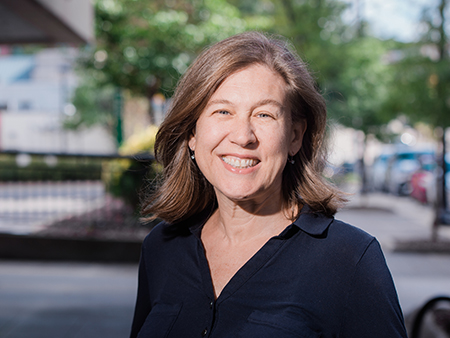 The latest grant for Andrea Cherrington, M.D., is $21.7 million over five years from the National Institute on Minority Health and Health Disparities to improve chronic disease outcomes for Black Americans in the Deep South.The undue burden of obesity, diabetes and hypertension in the Deep South is a focus for the 2021 Marchase Award winner, Andrea Cherrington, M.D. The award celebrates and encourages interdisciplinary work at the University of Alabama at Birmingham.
The latest grant for Andrea Cherrington, M.D., is $21.7 million over five years from the National Institute on Minority Health and Health Disparities to improve chronic disease outcomes for Black Americans in the Deep South.The undue burden of obesity, diabetes and hypertension in the Deep South is a focus for the 2021 Marchase Award winner, Andrea Cherrington, M.D. The award celebrates and encourages interdisciplinary work at the University of Alabama at Birmingham.
For Cherrington, interdisciplinary not only includes researchers across the schools and departments of UAB, but also envelops the lives and communities of people in rural areas across Alabama, Mississippi and Louisiana. Her latest effort to reduce health disparities and improve chronic disease outcomes — the Deep South Center to Reduce Disparities in Chronic Diseases — is funded by a newly awarded, five-year $21.7 million grant from the National Institute on Minority Health and Health Disparities. The grant is led by Cherrington, along with principal investigators Gareth Dutton, Ph.D., Orlando Gutierrez, M.D., and Monica Baskin, Ph.D.
Its goal? Prevent, treat and manage cardiometabolic diseases among racial minorities — primarily Black Americans — and low-income populations who suffer disproportionately from these diseases.
This requires an interdisciplinary approach, as she will explain in her lecture for the 2021 Richard B. Marchase, Ph.D., Interdisciplinary Research Symposium at UAB, which begins Monday, Nov. 1, at 1:30 p.m. The symposium will also feature keynote speaker Rochelle Walensky, M.D., director of the Centers for Disease Control and Prevention, and a panel discussion led by infectious diseases experts Jeanne Marrazzo, M.D., and Michael Saag, M.D., both professors of medicine in the UAB Marnix E. Heersink School of Medicine.
“Certainly,” Cherrington said of her interdisciplinary approach, “our teams include a wide variety of academic expertise in the sciences like clinical psychologists, statisticians and people with Ph.Ds. in health behavior. But they also include social sciences like anthropology and sociology, as we try to understand more about social determinants of disease at the individual level, at the community level and at the organizational level.”
Interdisciplinary also means including key stakeholders and community members, an approach she learned in her research fellowship at the University of North Carolina-Chapel Hill, where she gained skills in community-based participatory research. The fellowship came after she finished her training and was chief resident in the UAB Tinsley Harrison Internal Medicine Residency Program.
“I don’t think you can substitute for showing up and being present,” said Cherrington, a professor in the Department of Medicine Division of Preventive Medicine, in the UAB Heersink School of Medicine. “Showing up matters. Continuing to be present over time matters, not just showing up when you need something.
“We use a strengths-based model, which means we’re not sitting in the office thinking we have all the answers. Going out into the community and partnering with the people is critical. You learn about the strengths and assets that are there, about the resolve and commitment they already have for fixing these problems.
“Then we as academics can provide support and resources to elevate that voice.” This can also be viewed as a precision public health approach, which Cherrington says means having the right intervention, for the right people, at the right time. “It means understanding what people need in the place where they are.”
The Deep South Center to Reduce Disparities in Chronic Diseases will bring together a trans-disciplinary team of investigators from four institutions — UAB, Tuskegee University, Louisiana’s Pennington Biomedical Research Center and the University of Mississippi Medical Center — as well as regional non-academic partners. Together they will extend cardiometabolic research into real-world community and clinical settings to find effective interventions that reduce health disparities in obesity, diabetes and hypertension.
The Marchase Interdisciplinary Research Symposium is named in honor of Richard B. Marchase, Ph.D., former UAB vice president for Research and Economic Development. The annual Marchase Award honors a UAB investigator who leads or promotes interdisciplinary research on campus in the spirit of camaraderie that Marchase personified.